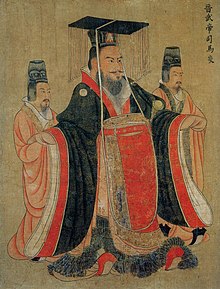Jin Wudi

Sima Yan ( Chinese 司馬炎 / 司马炎 , Pinyin Sīmǎ Yán , majority name Anshi 安 世 , Ān shì ; * 236 ; † May 17, 290 ) was the son of Sima Zhao and thus the grandson of Sima Yi . He ruled over China as Jin Wudi ( 晉武帝 / 晋武帝 , jìn wǔdì ). He was the first emperor of the Jin dynasty to ascend to the throne, having previously deposed the last Wei emperor, Cao Huan . He ruled from 265 to 290, and after destroying the Wu Empire in 280 , the unification of China was complete. Emperor Wu was known for his extravagance and sensitivity, especially after the unification of China. The legend goes about his excessive potency that he had over ten thousand concubines .
Emperor Wu is widely seen as a magnanimous and gentle ruler, but also a lavish one. His virtues in particular later turned out to be weaknesses because he tolerated the aristocratic families' lust for luxury too much. The people suffered a lot as a result. After establishing the Jin Dynasty, Emperor Wu was concerned about its stability. He assumed that the weakness of the Wei Dynasty was the fact that the princes did not have enough power. Therefore he gave his uncles, cousins and sons great military and civil powers, which on the contrary contributed to the destabilization of the dynasty and finally culminated in the War of the Eight Princes . This civil war led to the Wu-Hu uprisings, which destroyed the Western Jin Dynasty and forced migration to the areas south of the Huai River .
| predecessor | Office | successor |
|---|---|---|
| k. A. |
Emperor of China 265–290 |
Huidi |
| predecessor | Office | successor |
|---|---|---|
| Cao Huan |
Emperor of China (North) 265–290 |
Huidi |
| predecessor | Office | successor |
|---|---|---|
| Sun Hao |
Emperor of China (Southeast) 280–290 |
Huidi |
| personal data | |
|---|---|
| SURNAME | Jin Wudi |
| ALTERNATIVE NAMES | Sima, Yan; Sima, Anshi (majority name); Jin Wu Di |
| BRIEF DESCRIPTION | Emperor of China (265–290) |
| DATE OF BIRTH | 236 |
| DATE OF DEATH | May 17, 290 |